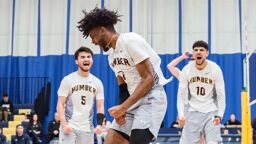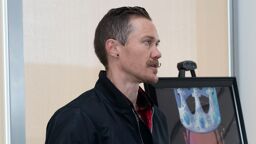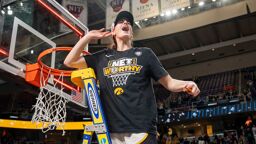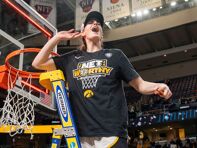A new documentary film is generating a stir around the lives and struggles of LGBTQ athletes, and the filmmakers hope its wide distribution on AT&T’s Audience network will help spur more action by teams, leagues and conferences to fight homophobic language in sports.
‘Alone In The Game,’ premiering tonight on Audience, features the voices of a couple dozen people in and around sports and the LGBTQ community, all opening up about their experiences. The perspectives of powerful, important people are highlighted in the film, including NBA commissioner Adam Silver, out former NBA player Jason Collins, Team USA athlete Chris Mosier, and ESPN’s LZ Granderson. We are also introduced to the stories of a former Vanderbilt football player, a trans high school wrestler, and a closeted Division I college football player whose name is not revealed.
The film paints a dire picture of sports as the epicenter of anti-LGBTQ bias in America and a desperately inhospitable place for LGBTQ people. We are told, through the experts interviewed and the lives we peek into, that the environment in sports – and in particular elite-level sports – is a complete disaster for anyone who isn’t cisgender and straight. Anything positive or inclusive about sports is relegated to a complete “180” the film takes in its final few minutes.
While the film does a good job of introducing people to some of the internal struggles faced by LGBTQ people in sports, it also unfortunately fails to paint a complete picture of sports for LGBTQ people, which today includes widespread acceptance.
Important for straight, cisgender people in and around sports to watch – and to be sure, on a mainstream network that will be the majority of people who watch the film – it also has the potential to breed more fear in the LGBTQ athletes and coaches who are still in the closet.
At the core of the discussion about LGBTQ inclusion in sports today are two key dynamics facing LGBTQ athletes at every level of sports.
RELATED: Homophobic language skews our view of acceptance in sports
The first is that the aura around sports is historically, and often practically, unwelcoming for LGBTQ people. It can feel, as the film says, like a very dark place. The language in and around sports can be brutal. Homophobic slurs, taunting about masculinity, and misunderstanding about trans people have led to a perceived culture in sports that would reject LGBTQ people if they come out to their teammates, coaches or fans.
Closeted athletes are overwhelmed by this dynamic.
Out athletes see the light through the darkness, as the other pertinent dynamic is that of vast, widespread acceptance and inclusion. Athletes who come out to their teammates (or publicly) overwhelmingly experience acceptance at a level they never thought imaginable because of what they have always been told about sports and what they’ve long heard in the locker room.
‘Alone In The Game’ focuses almost exclusively on the first dynamic: fear. The film spends 80 minutes reinforcing the perception that LGBTQ athletes are not wanted in sports, that they face widespread discrimination if they come out to anyone, and they should get out of sports while they still can.
This sentiment is specifically stated in the film by Kate Kendall, the executive director of the National Center for Lesbian Rights.
”My advice to a young LGBT person who is gifted as an athlete would be choose another career,” Kendall warns in the film. “These systems are not going to embrace and support you.”
Funny thing about what Kendall said: She doesn’t think what she said, and she didn’t mean it. When asked about her appearance in the film, Kendall said she couldn’t remember ever saying or thinking that (to be clear, she did in fact say it).
Instead, she sees all of the changes that have taken place in sports and sees the inclusion and hope now lighting the darkness.
“While I don’t recall the full context for my comment of several years ago discouraging LGBTQ athletes from pursuing a career in sports, I would today, without reservation encourage such an athlete to stay in the game,” Kendall told Outsports. “It has been the very presence of LGBTQ athletes and their allies that is responsible for the changed sporting landscape. While homophobia is alive and well in virtually every segment of society, including sports, the field has changed and is now a place of greater inclusivity and support, thanks largely to out LGBTQ athletes who refused to leave the sport they loved.”
The film’s greatest flaw is its failure to reflect what Kendall sees. While the film’s producer, David McFarland, is convinced that sports are not welcoming for LGBTQ people, the very people featured in the film defy that notion.
Some of the highlighted athletes in the film include Jason Collins, Robbie Rogers, Gus Kenworthy and Megan Rapinoe, all of whom have been accepted in their elite sports.
In the final few minutes of the film we see many others who have experienced the same: Abby Wambach, Sue Bird, Gareth Thomas, Tom Daley, Brittney Griner, Elena Delle Donne, Laura Ricketts, Rick Welts, Adam Rippon — all of them have come out while still active in their sport, all of them have continued their careers and all of them have been accepted, and even celebrated, for who they are.
For people in need of hope, this part of the film is tacked onto the end as an afterthought.
Most of the viewers of this film will be non-LGBTQ people. That’s a good thing. The struggles demonstrated by the cast of characters, and in particular the athletes we get to know best, are very real internal struggles that league commissioners, team presidents, coaches and staff can help to proactively diminish.
While the film could have the effect of pushing LGBTQ people deeper in the closet, its effect on non-LGBTQ people in sports could very well be an important one. Some of the stories of fear portrayed in the film are gut-wrenching. McFarland’s hope is that the film’s demonstration of the fear and sadness of the closet drives more people in power in the sports world to take further steps to create an outwardly inclusive environment.
This has the potential to be the film’s greatest success.
McFarland’s call to action is a great one. He told Outsports that when he talks to coaches and other sports leaders, his most important recommendation is to be proactive. He said he tries to focus then on shifting their own language and discussing homophobia and transphobia before, and when, it happens.
”Tell athletes to go have fun with their wives, girlfriends and boyfriends,” he tells coaches. That subtle yet proactive shift in language can make a world of difference for people in the closet.
Ultimately, ‘Alone In The Game’ has the potential to continue the escalation of inclusion efforts in sports. The more people see, feel and understand the struggles of LGBTQ people feeling like they have to live a lie, the faster we’ll get to the point when no one feels that way.
‘Alone In The Game’ premiers Thursday, June 28, at 8pmET on Audience.







































